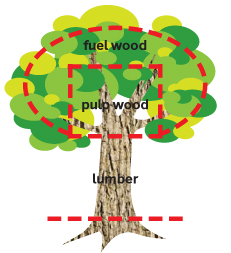Does Recycled Paper Really Save Trees?


But recycling doesn't save trees. At least not in commercial working forests, which is where our pulp and paper comes from. In a commercial forest, the same trees that are used to produce pulp and paper are also used to produce other commodities, such as lumber and veneer. Some parts of the same tree also can end up as firewood to heat rural homes or biomass to fuel steam boilers for industry and electrical generators.
True, recycling paper can reduce demand for some portion of the virgin tree fiber. But it doesn't save a tree that is destined for many applications. Companies such as Finch Paper, LLC are committed to full use of the fiber resource. The same trees used by Finch for the virgin-fiber component of its paper also are used in everything from veneered cabinetry to landscape mulch. And the fact that the trees are used commercially is what generates revenue to the landowner sufficient to cover forest management costs and a treasure trove of state and federal taxes.
Without revenues from commercial forestry, a great deal more land would be sold into the hands of real-estate and industrial developers, and would cease to function as viable forest ecosystems.
So let's see if Doc has this right: we actually need more trees cut down for use in paper in order to keep them from being cut down by real-estate developers? Actually, I do get it – managed forests are better than no forest at all. Of course, Peter's right about that. But in the end, less dependency on wood-pulp products is probably a good thing, even if in the short term we make that dependency much more efficient. I'm all for both, and to the degree that we can make trees a truly renewable resource, all the better.